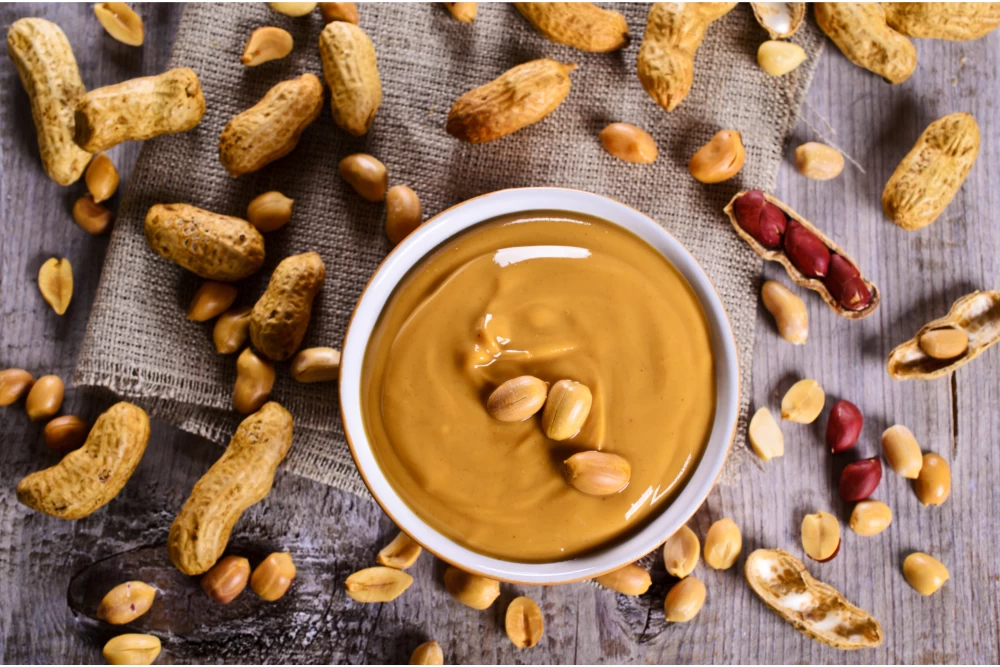
- 13th February 2024
Table of Contents
10 Health Benefits of Peanut Butter
Peanut butter is the king of spreads because it is both tasty and nutritious. The incredible nutritional profile that distinguishes it as the healthiest spread is the foundation of its popularity, not its irresistible taste. Let's explore the peanut butter's healthy qualities and find out why it's so popular among spreads. Peanut butter's nutritional information per serving (2 tablespoons):
| Nutrient | Amount |
|---|---|
| Calories | 188 |
| Total Fat | 16 grams |
| Saturated Fat | 3.3 grams |
| Cholesterol | 0 mg |
| Sodium | 5.4 mg |
| Potassium | 207.7 mg |
| Total Carbs | 6 grams |
| Dietary Fiber | 1.9 grams |
| Granulated Sugar | 3 grams |
| Protein | 8 grams |
| Iron | 3% of daily requirement |
| Vitamin B6 | 10% of daily requirement |
| Magnesium | 12% of daily requirement |
| Calcium | 1% of daily requirement |
- One of peanut butter's most impressive nutritional features is the high concentration of protein it contains. Peanut butter, which is rich in plant-based protein, gives you a steady supply of energy that lasts. If you're trying to hit your dietary targets, this is a great option because just one serving can provide a substantial amount of protein.
- Heart-Healthy Fats: Peanut butter is packed with heart-healthy fats, disproving the myth that fats are bad for you. Its high concentration of heart-healthy monounsaturated and polyunsaturated fats makes it a great choice. These fats are beneficial for heart health because they reduce levels of bad cholesterol. Monounsaturated and polyunsaturated fatty acids are the good fats found in peanut butter. When included in a balanced diet, these fats reduce the likelihood of becoming overweight.
- Packed with Nutrients: Peanut butter is more than just a source of protein and fat; it's a nutritional powerhouse. It provides a wide variety of nutrients that are crucial for the maintenance of different bodily functions and is rich in important vitamins and minerals like vitamin E, potassium, magnesium, and phosphorus.
- Nutritious Fiber: Peanuts and peanut butter are a great source of both soluble and insoluble fiber, which aids in regular bowel movements and alleviates constipation. There are 3 grams of fiber in just 32 grams (two tablespoons) of natural peanut butter, which is about 10% of the daily fiber needs. Peanut butter's health benefits are enhanced by the addition of dietary fiber. In addition to helping with weight control and promoting digestive health, fiber also makes you feel full for longer. Your digestive system will get a little help with every spoonful of this delicious spread.
- Plentiful Antioxidants: Resveratrol, a chemical with anti-inflammatory and heart-protective potential, is one of the many antioxidants found in peanut butter. By reducing the body's oxidative stress, these antioxidants help reduce the likelihood of developing chronic diseases. Peanut butter is packed with antioxidants that promote a healthy immune system and lower the risk of various chronic diseases, such as heart disease and type 2 diabetes. For heart-healthy monounsaturated and polyunsaturated fats, peanut butter is a great choice.
- Monitoring Blood Sugar Levels: Peanut butter, with all its creamy goodness and sugary sweetness, actually has a moderate glycemic index. Because of its gradual effect on blood sugar levels, it is a good option for people with diabetes or who want to keep their energy levels steady all day long. Studies have demonstrated that eating peanuts or peanut butter with high-carb or high-GL foods can help reduce the blood sugar spike. Because of the beneficial effects on blood sugar regulation caused by the healthy fats, protein, and fiber found in peanuts and peanut butter, these foods have a low GI and GL.

- Maintaining and Repairing Muscles: Peanut butter's amino acids are essential for these processes. Peanut butter is a tasty and healthy companion for anyone seeking to recover after a workout or maintain healthy muscles in general.
- Peanut butter's adaptability in the kitchen goes far beyond its use on bread and toast. Smoothies, oatmeal, and even savory dishes like satay sauces can all benefit from its easy incorporation. Thanks to its versatility, peanut butter can be enjoyed in a variety of delicious ways, while still providing health benefits.
- Peanut butter's high protein and healthy fat content makes it an excellent weight management tool for promoting fullness. It is a helpful tool for people trying to manage their weight because eating it with meals or snacks can reduce cravings.
- Nutrients That Benefit the Brain: Peanut butter contains nutrients that are good for your brain, like niacin and folate. These nutrients are involved in mental health and cognitive function.
As the nutritional benefits of peanut butter are revealed, it becomes evident that there are many more reasons to love it than just how it tastes. Peanut butter stands out as a nutritious spread that provides multiple benefits to the body, thanks to its protein-packed core, heart-healthy fats, and antioxidant profile.
Peanut butter is a beautiful example of how flavor and nutrition can work together in a balanced diet. Enjoy a gastronomic adventure and a nutritional boost with peanut butter, whether you spread it on toast, mix it into a smoothie, or use it as a base for savory dishes. Indulge in one of the healthiest spreads nature has to offer the next time you reach for that jar. Savor the creamy goodness and the knowledge.














